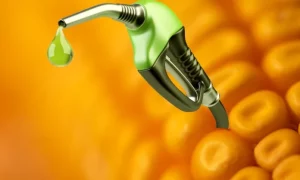Fuelling the future

India aims to revolutionize its energy landscape with 2G ethanol, addressing energy security and environmental concerns. Projections foresee substantial growth in biofuel demand. Policy recommendations advocate financial incentives, increased blending mandates, and infrastructure development. Leveraging advanced technologies and empowering farmers are key strategies. With concerted efforts, India can emulate global leaders, ushering in a sustainable energy future powered by 2G ethanol from dented corn.
India stands at a critical juncture in its quest for energy security and sustainable development. The country’s growing energy demands, coupled with concerns over environmental degradation and climate change, necessitate a transition towards cleaner and more sustainable energy sources. 2G ethanol, derived primarily from agricultural feedstock such as sugarcane, corn, and dented corn, offers a viable solution to these pressing challenges. This paper aims to explore the potential of 2G ethanol to transform India’s energy landscape, mitigate environmental degradation, and stimulate socio-economic growth. 2G Ethanol is hailed as a renewable, clean, and cost-effective alternative to traditional fuels like gasoline and cooking LPG.
It holds immense potential for India. Its utilization not only bolsters energy security but also aligns with decarbonisation efforts, crucial in combating the looming spectre of climate change. The strategic blending of 2G ethanol with petrol not only enhances combustion efficiency but also curtails harmful emissions, thereby mitigating the adverse impacts of vehicular pollution ~ a pressing concern in India’s urban centres. Moreover, the substitution of ethanol for LPG presents a revolutionary shift, mitigating risks associated with single-fuel dependency. Ethanol offers advantages over using heavy LPG cylinders with substantial reduction in the costs associated with maintaining infrastructure for LPG.
Ethanol thus emerges as a competing alternative to other fossil fuels with the least pollution. India’s strides in 2G ethanol blending initiatives over the past decade bear testament to its efficacy. Significant savings in foreign exchange, totaling to Rs. 78,118 crore, alongside a substantial reduction in CO2 emissions, amounting to 426 lakh MT, underscore the tangible benefits of embracing 2G ethanol as a viable energy solution. Moreover, these efforts have successfully substituted 142 lakh MT of crude oil during the same period, marking a significant contribution to energy security and sustainability. Equally noteworthy is the substantial support extended to farmers, underscoring the socio-economic dividends of 2G ethanol production.
Looking ahead, the trajectory for 2G ethanol’s growth appears promising. Projections globally indicate a substantial increase in biofuel demand, with renewable diesel and 2G ethanol expected to drive a near 30 per cent growth, reaching 38 billion litres over 2023-2028. India, positioned as a key player in this global transition, has the potential to make significant strides in 2G ethanol production, thereby bolstering its energy resilience while mitigating the environmental impacts. Global trends indicate a surge in biofuel demand, with 2G ethanol emerging as a key player in the transition towards renewable energy sources. Projections suggest a substantial increase in biofuel consumption, driven primarily by renewable diesel and 2G ethanol.
According to industry forecasts, global biofuel demand is expected to expand by 30 per cent over the next decade, reaching 38 billion liters by 2028. India, with its vast agricultural resources and growing energy needs, is poised to capitalize on this trend and emerge as a major player in the global 2G ethanol market. The production of 2G ethanol offers significant economic benefits for India, particularly in rural areas. 2G ethanol production creates employment opportunities across the value chain, from crop cultivation to processing and distribution. Moreover, the establishment of 2G ethanol biorefineries can stimulate rural industrialisation and infrastructure development, contributing to overall economic growth and poverty alleviation.
Additionally, 2G ethanol production generates valuable by-products such as distillers’ dried grains with solubles (DDGS), which can be used as high-protein animal feed, further enhancing the economic viability of 2G ethanol production. To fully unlock the potential of 2G ethanol and realize its socio-economic and environmental benefits, concerted efforts are required across multiple fronts. The following policy recommendations are proposed:
• The government should provide financial incentives and subsidies to promote 2G ethanol production, including tax breaks, grants for infrastructure development, and price support mechanisms for 2G ethanol producers.
• Increase the mandatory blending percentage of 2G ethanol in petrol to incentivize demand for 2G ethanol and stimulate investment in 2G ethanol production capacity.
• Invest in research and development initiatives to improve 2G ethanol production technologies, enhance crop yields, and develop sustainable feedstock supply chains.
• Facilitate market access for 2G ethanol producers by streamlining regulatory processes, reducing bureaucratic hurdles, and promoting public-private partnerships for 2G ethanol distribution and marketing.
• Provide technical assistance, training, and financial support to farmers to encourage the cultivation of 2G ethanol feedstock and ensure fair and remunerative prices for their produce.
• Develop and implement certification standards for sustainable 2G ethanol production to ensure environmental integrity and social responsibility across the 2G ethanol value chain.
• Invest in infrastructure development, including 2G ethanol biorefineries, storage facilities, and transportation networks, to support the expansion of 2G ethanol production and distribution capacity. The global precedence set by leading 2G ethanol producers such as the United States and Brazil serves as a beacon of inspiration for India. By leveraging advanced technologies and fostering conductive policy environments, India can emulate their success, ushering in a new era of energy self-sufficiency and sustainability. To realize this vision, concerted efforts are imperative. Government intervention, in the form of incentivizing megabiorefineries and ensuring dutyfree import of dented corn, will be instrumental in catalyzing the 2G ethanol revolution.
Moreover, empowering Indian farmers through lucrative incentives and technological support is of paramount importance in order to foster a conducive ecosystem for sustainable 2G ethanol production. In conclusion, the journey towards harnessing 2G ethanol’s potential is fraught with challenges, yet brimming with opportunities. By embracing this renewable resource that is dented inedible corn with zeal and determination, India can chart a course towards a greener, more prosperous future ~ one powered by the transformative potential of 2G ethanol.
Source Link : https://www.thestatesman.com/opinion/fuelling-the-future-1503297043.html















